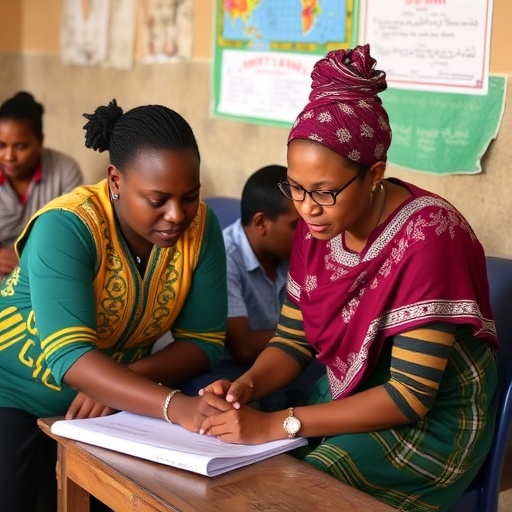In recent years, the quality of teacher preparation programs has gained significant attention, particularly in developing regions where educational reform is critical for national progress. A groundbreaking study conducted in the Southern Nations, Nationalities, and Peoples Region of Ethiopia provides profound insights into this issue. Researchers Abate, Edamo, and Demisse have embarked on an extensive analysis that aims to assess the quality of teacher preparation program implementation. This study unveils the mediating role of college-based capacities in the relationship between teacher preparation programs and technology integration in educational settings.
The significance of this research cannot be overstated as it sheds light on the intricate relationship between teacher quality and student learning outcomes. Effective teaching is pivotal for imparting knowledge and fostering critical thinking skills, integral components of a successful educational journey. Yet, without the proper framework and resources provided by teacher preparation programs, aspiring educators may struggle to meet the needs of their diverse student populations. This study emphasizes that understanding the internal mechanisms of these programs is crucial for enhancing overall educational quality.
The researchers employed a robust methodological approach, incorporating both qualitative and quantitative aspects to gather comprehensive data. By engaging with various stakeholders, including teacher trainees, educators, and college administrators, the research team was able to glean valuable insights into the operational dynamics of teacher preparation programs in the region. This multifaceted approach not only enriches the findings but also raises critical questions about the effectiveness of current educational practices.
Central to their analysis is the concept of college-based capacities, which refers to the resources, knowledge, and support systems that educational institutions provide to their trainees. These capacities are pivotal for facilitating the integration of modern technology into the teaching landscape, thus enhancing the overall learning experience. In a world where digital literacy has become synonymous with academic success, it is imperative that teacher preparation programs evolve to incorporate technological tools and methods that reflect current educational paradigms.
Moreover, the study establishes a direct correlation between the quality of college-based capacities and the level of technology integration within classrooms. The findings illustrate that institutions with well-defined support structures, adequate training in tech usage, and a culture of innovation are better positioned to equip future educators with the skills necessary for navigating a digital landscape. This relationship highlights the need for educational institutions to prioritize investment in their infrastructure and training programs, ensuring that future teachers are well-prepared to meet the demands of a rapidly changing educational environment.
The implications of these findings extend beyond the immediate context of Ethiopia. As countries worldwide grapple with the challenges of integrating technology into education, this study offers a critical lens through which to analyze the effectiveness of teacher preparation programs. By recognizing the importance of foundational capacities, other regions can adopt similar frameworks to bolster their educational systems and enhance teacher efficacy.
In addition to examining college-based capacities, the research provides recommendations for policy changes aimed at improving the quality of teacher preparation. Policymakers and educational leaders must engage in collaborative efforts to ensure that teacher training aligns with the evolving needs of the student population. This includes fostering partnerships between educational institutions and technology developers, creating collaborative ecosystems that enhance learning experiences.
An essential takeaway from this study is the advocacy for continuous professional development for educators. Teachers must not only be equipped with initial training but also engaged in ongoing learning opportunities that focus on best practices in technology integration. This creates a culture of lifelong learning, where educators are encouraged to adapt and innovate in their teaching methods, ultimately benefiting their students.
The study’s findings resonate with global educational trends, emphasizing the urgency for adaptive and technology-focused teaching practices. As institutions worldwide lean towards digital tools and resources, it is essential to ensure that teachers are adequately prepared to implement these resources effectively. This calls for a reevaluation of current curricula and the introduction of more hands-on training experiences that better equip future educators.
Concluding, the research conducted by Abate and colleagues acts as a catalyst, urging educational stakeholders to prioritize the enhancement of teacher preparation programs. The direct link between college-based capacities and technology integration serves as a clarion call for a collective rethinking of what constitutes effective teacher training. As the educational landscape continues to evolve, it is crucial that institutions cultivate environments that not only inspire educators but also equip them with the necessary tools to succeed in their pivotal roles.
This analysis presents a powerful argument that emphasizes the multi-dimensional nature of teacher preparation programs and technology integration. The future of education hinges upon the ability of teacher training institutions to harness their capacities effectively, thus ensuring that all students access a quality learning environment.
In an era defined by innovation and technology, the quality of education must be a top priority. The findings from this study serve as a reminder that to elevate educational standards, we must focus on supporting our educators, building their capacities, and ultimately empowering them to succeed.
Subject of Research: Teacher preparation program implementation quality in Ethiopia
Article Title: Assessing the quality of teacher preparation program implementation: the mediating role of college-based capacities in the relationship with technology integration in the Southern Nations, Nationalities, and Peoples Region of Ethiopia.
Article References:
Abate, B.L., Edamo, D.L. & Demisse, M.M. Assessing the quality of teacher preparation program implementation: the mediating role of college-based capacities in the relationship with technology integration in the Southern Nations, Nationalities, and Peoples Region of Ethiopia.
Discov Educ 4, 446 (2025). https://doi.org/10.1007/s44217-025-00670-9
Image Credits: AI Generated
DOI:
Keywords: Teacher preparation, technology integration, educational quality, Ethiopia, college-based capacities.




